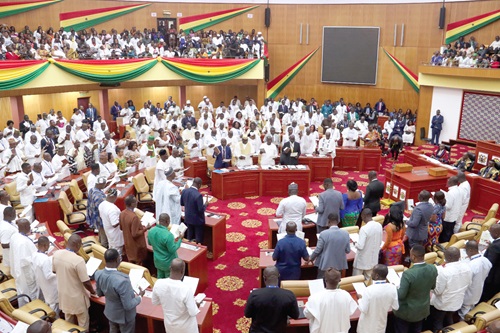The Eighth Parliament, in my opinion, witnessed too many moments of adversarial politics.
The composition (137-137-1) was often the explanation given why that was the case. Initially, i expected that given the configuration, compromising and building consensus was going to be the guiding principle. The adversary was further exacerbated by our increasing sharp partisan edges and deep polarisation.
In my op-ed piece on November 16, 2024, I wrote this – “As the life of the 8th Parliament draws to a close and elections fast approach, it takes no stretch of the imagination to say none of the presidential candidates want the composition of the 9th Parliament to look anything like the 8th.”
I feared that more partisan acrimony would be the country’s portion, should our Ninth Parliament look like the Eighth.
Early days
The Ninth Parliament looks nothing like the Eighth. The National Democratic Congress (NDC) holds a super majority which includes the independent members who have chosen to caucus with them.
Yet, in the absence of a closely divided Parliament, the early days raise some worrying signals judging from events during the vetting process.
Before proceeding, it is important to note this.
The vetting of nominees is not necessarily a problem.
Parliament has a solemn obligation in the appointment process as any new administration tries to put together the people who will occupy important ministerial roles.
Parliament’s role is critical and when executed well ensures that the public gets a sense of a nominee’s suitability for office including their technical capacity and competence. It also allows Parliament to do a due diligence check on nominees.
But the very unfortunate scenes of chaos during the vetting of ministerial nominees on that fateful Thursday night send signals that perhaps life in the Ninth Parliament may not be any less adversarial than the Eighth.
To even worsen these signals are two other incidents – the Minority Leader’s scolding of the Clerk of Parliament (granted he has rendered an apology) and the unsavory remarks made about Zanetor Agyeman-Rawlings by a yet-to-be-identified Member of Parliament in the chamber.
These are just the early days. What should Ghanaians expect?
Changing trajectory
Judging from the reaction to the chaos which erupted at the vetting committee, it is fair to assert that Ghanaians expect more positive interactions and exemplary behaviour from their Members of Parliament.
There is an opportunity to do this with the upcoming vetting of deputy ministerial nominees.
However, two things must happen.
First, rules guiding the vetting process must be re-examined.
Clear specific rules and guidelines can help so there are no ambiguities about routine issues such as the number of nominees to be vetted per day, the duration, the parameters of questions to be asked, etc.
This is not to suggest a highly prescriptive process but to highlight the need for greater clarity on how the process can proceed smoothly.
Second, the role of the chair is important.
The chair must be firm in applying the rules of procedure. In doing so, the chairperson must be fair and impartial.
It is a delicate balancing act that must recognise both the political nature of the process and the constitutional imperative to properly vet a President’s nominee.
Beyond the vetting, the leadership of Parliament, as a matter of necessity, must dialogue on how to move forward in a way that reduces the partisan acrimony in the house.
Whatever blueprint is agreed upon, it is incumbent on the leadership of each caucus (NDC and NPP) to bring along their members to respond positively to it.
The Majority may not feel compelled to engage in such dialogue given the size of their majority.
The Minority may not feel compelled to engage despite their size, knowing very well that they can resort to disruptive tactics as a way of frustrating the Majority.
If these political temperaments fester, it does nothing but potentially cause further deterioration in the quality of interactions among our Members of Parliament.
And this is even before the house takes up other significant government business such as the budget.
What’s the incentive to change this trajectory?
As mentioned previously, both the Majority and Minority may feel no compulsion to change this trajectory.
If this posture is further guided by partisan political temperaments, then the prospects look dim.
However, here is the incentive for our Members of Parliament – reshaping the perceptions of Ghanaians about the institution.
It is worrying that only nine per cent of Ghanaians say they trust Parliament “a lot”; 82 per cent say Members of Parliament “never/only sometimes” try to listen to what ordinary people have to say; and 51 per cent say “most/all of them” are involved in corruption (Afrobarometer Round 10, 2024).
Maybe approaching parliamentary business differently can help change these perceptions.
The writer is the Project Director, Democracy Project

